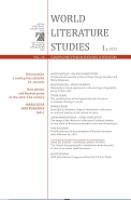The Central European path to worldliness from the point of view of so-called small literatures
The Central European path to worldliness from the point of view of so-called small literatures
Author(s): Anna Zelenková, Agnieszka Janiec-NyitraiSubject(s): Fiction, Studies of Literature
Published by: Ústav svetovej literatúry, Slovenská akadémia vied
Keywords: Central European literature. World literature. Global literature. Karel Čapek. Witold Gombrowicz. Ivan Horváth. Sándor Márai.
Summary/Abstract: Although the acceptance of a text into world literature is directly related to the importanceof its country and language of origin, works from so-called small literatures can also become partof the global canon. They establish their “worldliness” not on the power of extraliterary moments,but on the ability to constitute the world using the aestheticization of national images. This articleanalyzes four literary-historical examples of authors (Ivan Horváth, Karel Čapek, SandorMárai, and Witold Gombrowicz) attempting to become world authors through their “CentralEuropeanism”. Horváth seeks artistic inspiration for his dreamlike visions in French culture,Čapek attracts readers with the universality of his humanistic ideas, Márai embodies intellectualthe nostalgia for the vanished Habsburg Empire, and Gombrowicz intuitively anticipatesthe postmodern grotesque. Despite their differences in genre and theme, these authors areconnected by their inclination towards the West. At the same time, they all demonstrate thatin this distinctive and indigenous (in terms of values) “interspace” between the West andthe East, there is no “pure” national literature that does not synthesize a diverse foreign element.It is obvious that the way of this aestheticization of local “peripherality” implies their possiblepaths to “worldliness”.
Journal: World Literature Studies
- Issue Year: 15/2023
- Issue No: 1
- Page Range: 88-101
- Page Count: 14
- Language: English

